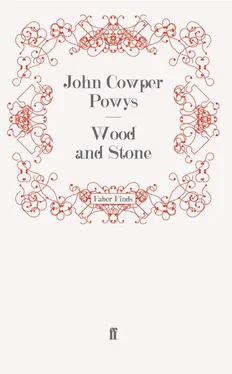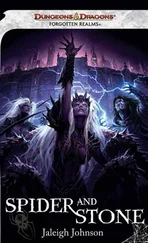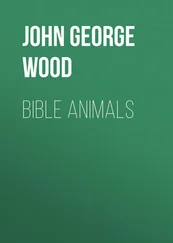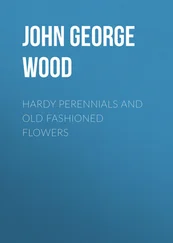Suddenly he shook his cane in the air and almost leaped for joy. He remembered the existence, at the spot where the lane they were seeking began, of a large dilapidated barn, used, by the yeoman-farmer to whom the Chase belonged, as a rough store-house for cattle-food. The spot was so attractive a resting-place for persons tired with walking, that it seemed as though it would be a strange chance indeed if the two wanderers did not take advantage of it. The point was, could he forestall them and arrive there first?
He surveyed the landscape around him with an anxious eye. It seemed as though by following the ridge of the hill upon which he stood, and crossing every obstacle that intervened, he ought to be able to do so — and to do so without losing sight of the two companions, as they unsuspiciously threaded their way over the flats.
Having made his resolution, he lost no time in putting it into action. He clambered without difficulty into the meadow on his right, and breaking, in his excitement, into a run, he forced his way through three successive bramble-hedges, and as many dew-drenched turnip-fields, without the least regard to the effect of this procedure upon his Sunday attire.
Every now and then, as the contours of the ground served, he caught a glimpse of the figures in the valley below, and the sight hastened the impetuosity of his speed. Once he felt sure he observed them pause and exchange an embrace, but this may have been an illusive mirage created by the mad fumes of the tempestuous jealousy which kept mounting higher and higher into his head. Recklessly and blindly he rushed on, performing feats of agility and endurance, such as in normal hours would have been utterly impossible.
From the moment he decided upon this desperate undertaking, to the moment, when, hot, breathless and dishevelled, he reached his destination, only a brief quarter of an hour had elapsed.
He entered the barn leaving the door wide-open behind him. In its interior tightly packed bundles of dark-coloured hay rose up almost to the roof. The floor was littered with straw and newly-cut clover.
On one side of the barn, beneath the piled-up hay, was a large shelving heap of threshed oats. Here, obviously, was the sort of place, if the lovers paused at this spot at all, where they would be tempted to recline.
Directly opposite these oats, in the portion of the shed that was most in shadow, Clavering observed a narrow slit between the hay-bundles. He approached this aperture and tried to wedge himself into it. The protruding stalks of the hay pricked his hands and face, and the dust choked him.
With angry coughs and splutters, and with sundry savage expletives by no means suitable to a priest of the church, he at length succeeded in firmly imbedding himself in this impenetrable retreat. He worked himself so far into the shadow, that not the most cautious eye could have discerned his presence. His sole danger lay in the fact that the dust might very easily give him an irresistible fit of sneezing. With the cessation of his violent struggles, however, this danger seemed to diminish; for the dust subsided as quickly as it had been raised, and otherwise, as he leant luxuriously back upon his warm-scented support, his position was by no means uncomfortable.
Meanwhile Luke and Gladys were slowly and deliberately crossing the darkening water-meadows.
Gladys, whose geographical knowledge of the district was limited to the immediate vicinity of her home had not the remotest guess as to where she was being led. For all she knew Luke might have gone crazy, like his brother, and be now intending to plunge both himself and her into the depths of some lonely pool or weir. Nevertheless, she continued passively and meekly following him, walking, when the path along the dyke’s edge narrowed, at some few paces behind him, with that peculiar air of being a led animal, which one often observes in the partners of tramps, as they plod the roads in the wake of their masters.
The expanse they traversed in this manner was possessed of a peculiar character of its own, a character which that especial hour of twilight seemed to draw forth and emphasize. It differed from similar tracts of marsh-land, such as may be found by the sea’s edge, in being devoid of any romantic horizon to afford a spiritual escape from the gloom it diffused.
It was melancholy. It was repellant. It was sinister. It lacked the element of poetic expansiveness. It gave the impression of holding grimly to some dark obscene secret, which no visitation of sun or moon would ever cajole it into divulging.
It depressed without overwhelming. It saddened without inspiring. With its reeds, its mud, its willows, its livid phosphorescent ditches, it produced uneasiness rather than awe, and disquietude rather than solemnity.
Bounded by rolling hills on all sides save one, it gave the persons who moved across it the sensation of being enclosed in some vast natural arena.
Gladys wished she had brought her cloak with her, as the filmy white mists rose like ghosts out of the stagnant ditches, and with clammy persistence invaded her unprotected form.
It was one of those places that seem to suggest the transaction of no stirring or heroic deeds, but of gloomy, wretched, chance-driven occurrences. A betrayed army might have surrendered there.
Luke seemed to give himself up with grim reciprocity to the influences of the spot. He appeared totally oblivious of his meek companion, and except to offer her languid, absent-minded assistance across various gates and dams, he remained as completely wrapped in reserve as were the taciturn levels over which they passed.
It was with an incredible sense of relief that Gladys found herself in the drier, more wholesome, atmossphere of Hullaway Chase. Here, as they walked briskly side by side over the thyme-scented turf, it seemed that the accumulated heat of the day, which, from the damp marsh-land only drew forth miasmic vapours, flung into the fragrant air delicious waftings of warm earth-breath. With still greater relief, and even with a little cry of joy, she caught sight of the friendly open door of the capacious barn, and the shadowy inviting heap of loose-flung oats lying beneath its wall of hay.
“Oh, we must go in here!” she cried, “what an adorable place!”
They entered, and the girl threw upon Luke one of her slow, long, amorous glances. “Kiss me!” she said, holding up her mouth to him beseechingly.
The faint light of the dying day fell with a pale glimmer upon her soft throat and rounded chin. Luke found himself disinclined to resist her.
There were tears on the girl’s cheek when, loosening her hold upon his neck, she sank down on the idyllic couch offered them, and closed her eyes in childish contentment.
Luke hung over her thoughtfully and sadly. There is always something sad, — something that seems to bring with it a withering breath from the ultimate futility of the universe, — about a lover’s recognition that the form which formerly thrilled him with ecstasy, now leaves him cold and unmoved. Such sadness, chilly and desolate as the hand of death itself, crept over the stone-carver’s heart, as he looked at the gently-stirring breast and softly-parted lips of his beautiful mistress. He bent down and kissed her forehead, caressing her passively yielded fingers.
She opened her eyes and smiled at him, the lingering smile of a soothed and happy infant.
They remained thus, silent and at rest, for several moments. It was not long, however, before the subtle instinct of an enamoured woman made the girl aware that her friend’s responsiveness had been but a momentary impulse. She started up, her eyes wide-open and her lips trembling.
“Luke!” she murmured, “Luke, darling, — ” Her voice broke, in a curious little sob.
Читать дальше












